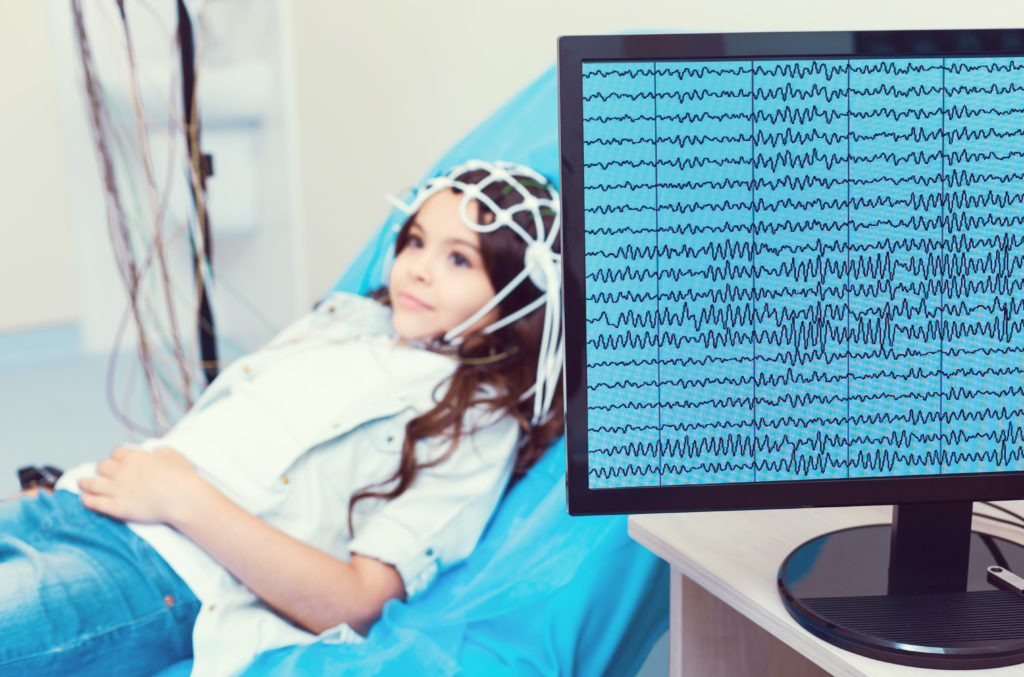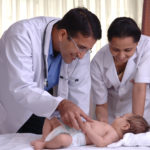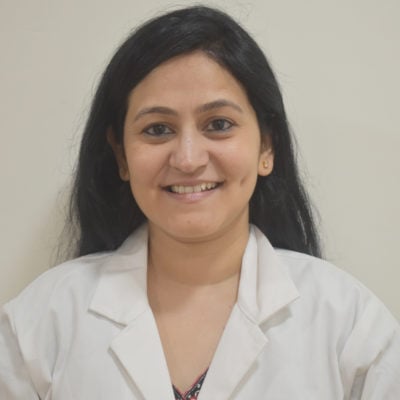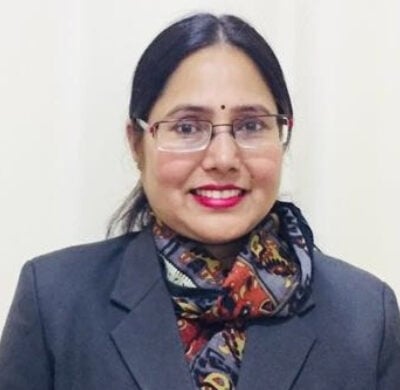Pediatric Neurology
Overview
Nothing can be more exciting than enjoying the milestones of your little one. A child’s brain undergoes a beautiful and wondrous surge of growing neural connections and we understand the concerns of the family when something goes off track in this journey.
That is why our Pediatric Neurologist team at Sitaram Bhartia works with you to provide comprehensive care to help your child reach his maximum potential. We help evaluate, diagnose and treat disorders of the brain, spinal cord, muscle and nerves.
What is Pediatric Neurology?
Pediatric Neurology is a subspecialty of paediatrics which caters to a diverse spectrum of neurological illnesses related to the brain, spinal cord, nerves and muscles.
Brain and neural disorders may occur when the seamless coordination between the brain and body breaks.
A child can present with developmental delay, seizures, abnormal movements, weakness, loss of tone, numbness, frequent headaches, confusion and vision loss etc.
Who is a Pediatric Neurologist?
Pediatric Neurology is a subspecialty of paediatrics which caters to a diverse spectrum of neurological illnesses related to the brain, spinal cord, nerves and muscles.
Brain and neural disorders may occur when the seamless coordination between the brain and body breaks. In such a situation, a child experiences frequent headaches, seizures, developmental delay, abnormal movements and weakness like numbness, confusion and vision loss.
When should you visit a pediatric neurologist?
You must consider visiting a pediatric neurologist if you notice
- a delay in motor skills or speech or loss of milestones
- staring spells, abnormal shaking of the body, jerks, loss of consciousness
- abnormal movements, paralysis, weakness
- Behavioral problems – hyperactivity, aggressiveness etc.
At times, it is difficult to recognize the disorder at its early stage, sometimes even by the doctor, which is why it’s important to get specialized consultations when you are in doubt. Your child can be evaluated by the expert and once diagnosed, can begin treatment before it gets too late.
Meet the Team
The Pediatric Neurology team is focused on delivering care customised to your child, keeping in mind their age, sensitivity to treatments, any potential hindrances and associated psycho-social contexts. We work closely with the Child Development Clinic to bring better results.
Conditions Treated -
- Seizures & epilepsy
- Cerebral palsy
- Developmental delays
- Congenital birth defects
- Dysmorphic child
- Autism
- Attention Deficit Hyperactivity Disorder (ADHD)
- CNS infections
- Childhood stroke
- Trauma and neurocritical care
- Genetic and metabolic disorders
- Neuroinflammatory disorders
- Spinal cord disorders
- Nerve and muscle disorders
- Movement disorders (Tics, Tourette’s syndrome etc)
- Neonatal neurological problems
- Brain and spinal cord tumors
Services provided -
- Comprehensive Neurological examination
- Electroencephalography (EEG)
- Video EEG
A Glance at the conditions treated –
- Seizures and Epilepsy:
A seizure is abnormal uncontrolled activity of the brain which can manifest as vigorous body movements or trembling in a part or the whole body. Seizures occurring more than once or repeatedly may indicate Epilepsy.
Seizures are not uncommon in childhood. It can occur due to a lack of oxygen to the brain, infections, congenital brain defects, genetic problems etc.
Not every seizure or epilepsy requires treatment, and the risk and benefits of the medicine should be weighed. Our Pediatric neurology team provides consultations, ongoing care and diagnostics for children and adolescents with seizures or epilepsy.
- Cerebral Palsy (CP)
Children with Cerebral Palsy can exhibit delays in motor skills and social milestones. They require an intense rehabilitation program. The condition can also be complicated by seizures and /or abnormal tone which requires treatment by medications.
Timely evaluation and care can minimize parents’ anxiety and the child’s suffering.
- Autism:
Autism is a disorder of language and communication. Children with Autism show delays in speech and a lack of non-verbal means of communication like eye-contact, gesticulating or pointing.
Parents often bring the child to a neurologist around 2 years of age, when they notice that the child does not speak. Autism can be suspected early by observing eye contact or the use of gestures.
The first years are very vital for the child’s development and parents should consult a pediatric neurologist or a developmental pediatrician if they suspect something is not right.
Sometimes it turns out that the child is just not willing to mingle with others or does not want to budge from a fixed routine and resists change or is labelled as very notorious and naughty.
Our pediatric neurologist works together with the Child Development Clinic at Sitaram Bhartia to empower children with Autism so they can flourish.
- Attention Deficit Hyperactivity Disorder (ADHD):
ADHD is a behavioural problem characterized by hyperactivity, inability to concentrate or sit at one place and a tendency to get easily distracted.
Parents should seek medical help if these signs are noticed or in case the school complains about such behaviours. It’s important to rule out other organic causes like hearing defects, poor vision or certain neurological conditions like seizures etc. before labelling a child ‘hyperactive’.
ADHD is treated with behavior therapy, and if required, the medications can be given by a specialist.
- Dysmorphism
Dysmorphic feature is a difference in body structure. It can be present in isolation or there may be multiple findings which could indicate a congenital disorder or a genetic syndrome.
A thorough examination of the child not only for visible dysmorphic features but also screening of the internal organs like the brain, heart, abdomen and genitals is a must so that parents are cautioned about upcoming symptoms or warning signs.
Genetic testing for these disorders are now available in India and should be carried out not only for the benefit of the child but also to understand its implications for the family and future pregnancies.
- Neural tube defects/ Spinal cord defects
Neural Tube Defects (NTD) are the defects in the spinal column and/or the brain. They happen during the first few days of conception when the mother may be still unaware of pregnancy.
NTD ranges from severe brain defects like anencephaly (which are not compatible with life) to spinal defects (open /closed) which may need attention immediately after birth.
A multidisciplinary approach and evaluation by neonatologist, pediatric neurologist and pediatric surgeon /neurosurgeon are required to reach a decision regarding treatment.
Sometimes NTD can present as a dimple in the sacral area (lowermost part of the spine), wherein the child may be asymptomatic at birth and may start showing symptoms like difficulty in walking, frequent falls or urinary problems. These could be signs of Tethered Cord Syndrome. In this condition, the lower end of the spinal cord adheres to the vertebral column and gets stretched as the child grows. It requires de-tethering or release which leads to a dramatic improvement.
- Movement disorders:
Movement disorders are a group of disorders where a child presents with either excessive movements or has a paucity of voluntary and involuntary movements.
Tremors, Tics, Tourette’s syndrome, Chorea, Dystonia, Parkinsonian syndrome (or bradykinesia) are some examples of movement disorders. Some movements interfere with daily activities and such children require to go on medications after evaluation.
They can be sudden and abrupt at the onset and these cases require thorough investigation as some can be an indication of an underlying complex neurological condition.
We have expertise in evaluating and treating children with any kind of simple/complex movement disorder.
- Childhood stroke:
A stroke or vascular insult to the brain can be caused either by a reduced supply of blood to the brain (ischemic) or because of bleeding in the brain (hemorrhagic).
The child can present with a range of symptoms including headache, dizziness, limb weakness, weakness of muscles of the face and complete loss of consciousness. It can be caused by multiple factors which need thorough investigation and immediate intervention.
Our unit at Sitaram Bhartia can help in evaluation, diagnosis and treatment of this neurological catastrophe and also give you a plan for prevention of further attacks. A complete and thorough evaluation of your child’s nervous system is essential.
- Neuroinflammatory disorders:
The neuroinflammatory disorder is the condition where heightened immune responses lead to damage of the brain, e.g. Acute Demyelinating Encephalomyelitis (ADEM), Neuromyelitis Optica (NMO), Transverse Myelitis (TM), Autoimmune Encephalitis etc.
It is very important to distinguish infections from inflammation as the treatment is altogether different. While we require antibiotics or antivirals for infection, inflammatory disorders are treated with steroids and other immunosuppressive drugs.
A detailed clinical assessment, proper evaluation including MRI Brain and Spinal Tap and early initiation of the treatment can lead to a dramatic improvement in these children.
- Neurometabolic Disorders:
Neurometabolic diseases are an important group of disorders which occur mostly in newborns and infants. They can present with a decreased level of consciousness, uncontrollable epilepsy, muscle weakness, inability to feed, visual, hearing problems etc.
These are a group of genetic disorders that disrupt how the body uses or produces energy from food. When this happens there is either too much of a chemical which can be toxic or too little of others that are needed for a healthy brain and body.
It can be diagnosed by various metabolic and genetic testing. These disorders can not be treated but can be kept under control by supplementing the deficient chemical or by following dietary restrictions.
Early diagnosis is key in determining the outcome. Genetic diagnosis is also important as the condition can recur in subsequent childbirths.
At Sitaram Bhartia Hospital, we provide you with comprehensive consultation, metabolic testing, genetic evaluation and counselling for future childbirths.
- Hypotonia (low tone)
Hypotonia means a loss of muscle tone. Infants/children present with looseness of body and developmental delay, especially motor delay.
Many times it is associated with nutritional deficiencies, and is easily manageable with treatment if identified and treated on time. Sometimes it does require a very detailed evaluation of the neuromuscular system as it can be caused by problems in the spinal cord (e.g. Spino Muscular Atrophy, SMA), nerve diseases, muscular disorders or could be syndromic or genetic.
An early diagnosis will not only help the child but also the family as most diseases have a tendency to recur in future pregnancies. Please do consult a pediatric neurologist if you feel your child feels different, limp or loose.
A Glance at procedures performed –
- Comprehensive neurological examination:
A neurological exam helps in assessing the functioning of the nervous system of the child. The test checks the child’s responses or interaction with their surroundings, the reflexes, motor functions and sensory receptors.
- Electroencephalogram(EEG)
An EEG is performed to identify problems related to the electrical activity of the brain.
It is a very simple procedure where the technician sticks small metal cups with thin wires (electrodes) on the scalp with the help of an adhesive gel while your child is lying on the bed or sitting. The waveforms are recorded or seen on a monitor. It is a non-invasive and an absolutely painless procedure. Your child does not feel any shock on the scalp or elsewhere.
The whole process requires 45 mins to an hour. Sometimes your doctor can advise a prolonged record for hours to capture an event in patients who have frequent seizures.
Instructions for preparation: The child’s scalp should be washed clean and should be devoid of oil or any kind of gel. Your doctor may give you medicine to sleep and the child has to lie still.
EEG is done to diagnose seizure or epilepsy. It can also be used in patients with sleep disorders, behavioural problem or an unconscious patient.
Our Pediatric Neurologist, Dr. Rafat has received a comprehensive training in reading and interpreting EEG’s and has read over 10,000 EEG’s and video EEG’s.
- Video EEG
Video-EEG monitoring is a procedure that points out behavioral correlations or changes in the recorded sequences of the patient.
In the procedure, the patient is supposed to monitor activities that one does regularly like sleeping, reading, speaking, walking and watching television.
What is always kept in mind while tracing EEG, is that the child’s natural instincts are recorded for the test.
Sometimes more than one epileptic attack has to be recorded as per the requirement based on the case.
- Spinal Tap/Lumbar Puncture:
A spinal tap is a procedure in which Cerebrospinal fluid (CSF) is removed by inserting a small needle in between two lumbar bones(vertebrae).
Cerebrospinal fluid (CSF) is sent for examination in patients suffering from CNS infections (meningitis) or inflammatory disorders like Guillain Barre syndrome. It can also be used for intracranial pressure monitoring.
In a very young child, it is done after sedating the child with IV medication. In older children or adults it can be done under local anesthesia.
It is mandatory to send CSF for examination in a child with fever, altered level of consciousness and or seizures/fits to decide the line of treatment. The post-procedure headache is the most common side effect.





